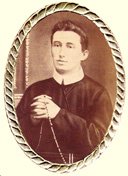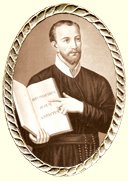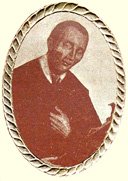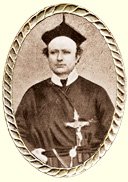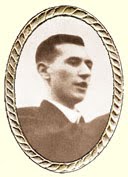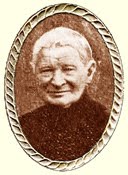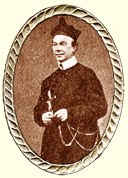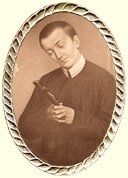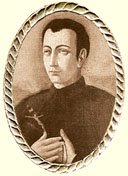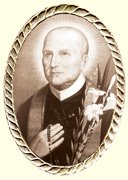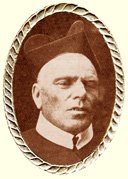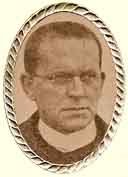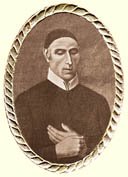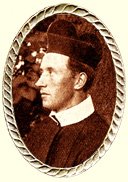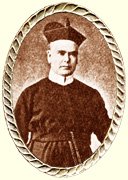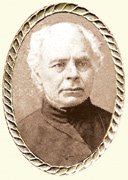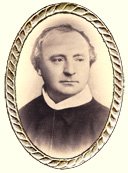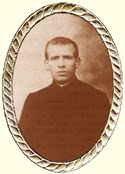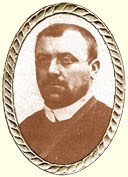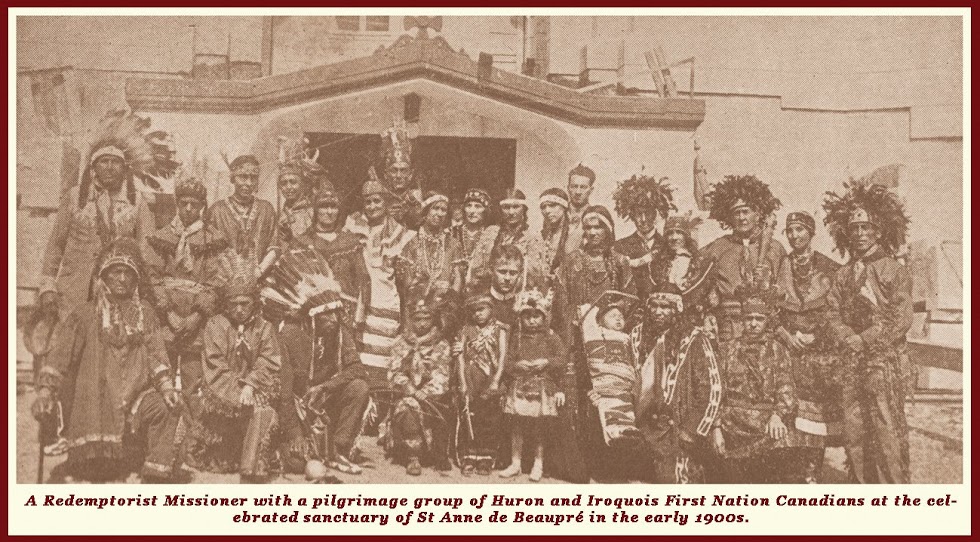Rev. Fr Johannes Hofer, C.SS.R. (1879-1939)
A Distinguished Hagiographer
 We must all die, but we know not where: no doubt Father Hofer told himself this during his lifetime, little knowing that he himself would not end his earthly life in his own country, but at Rome on the Island in the Tiber, on the first day of the 100th year since the canonization of St Alphonsus.
We must all die, but we know not where: no doubt Father Hofer told himself this during his lifetime, little knowing that he himself would not end his earthly life in his own country, but at Rome on the Island in the Tiber, on the first day of the 100th year since the canonization of St Alphonsus.He was born at Meranum on 6th December,1879, in that southern area of the Tyrol which since the end of the Great War is under Italian jurisdiction. Counted among his ancestors was the famous Andreas Hofer, the champion and victim of his country’s liberty. When he was still of a tender age Johannes Hofer came to Oenipons where our order has had a college from its early days and heard the voice of The Redeemer inviting him to join His Congregation. He served his novitiate under the guidance of the Servant of God, William Januschek, C.SS.R. to whom he rendered heart-felt gratitude throughout his life. On the Feast of St Alphonsus in 1899 at Eggenburg he took his final vows to which he remained faithful until death. When the year following his ordination to the priesthood (31st July 1905) was completed he came to the Junior Seminary at Katzeldorf as Lector. If you exclude the six months as Lector at Mauntern and the six years (1908-1914) spent in the philosophy faculty at the University of Oenipens, undertaking higher studies, particularly in history, then he lived permanently at Katzeldorf from 1906 to 1938, first as Lector in the Junior Seminary or as Rector or Public Moderator of Studies.
 One cannot express in a few words how much this seminary of the Austrian Province owes to Father Hofer alone. By impressing on it the mark of his personality, he inculcated a manly piety in the young men, nourished by the inspired books of Holy Scripture and the sacred liturgy of the Church. To increase devotion to the Most Holy Mother of God he founded a Marian Association amongst the youngsters. It is clear, too, that a love of firmly grounded knowledge was inspired by this most learned of men.
One cannot express in a few words how much this seminary of the Austrian Province owes to Father Hofer alone. By impressing on it the mark of his personality, he inculcated a manly piety in the young men, nourished by the inspired books of Holy Scripture and the sacred liturgy of the Church. To increase devotion to the Most Holy Mother of God he founded a Marian Association amongst the youngsters. It is clear, too, that a love of firmly grounded knowledge was inspired by this most learned of men.When the First World War ended he became advisor to his provincial Superior, Aloysius Oberrauch, to help overcome the great difficulties which faced them and to make fundamental renovations and extensions to the buildings of the Junior Seminary. This major task was completed with God’s help in 1924 before the end of the 40th anniversary of the seminary’s foundation. His efforts and perseverance paid off in our boy’s school by acquiring the right to run a public school. So, in May 1938 the first examinations for older students were held in the school. The first and, sad to say, the last. Father Hofer was the driving force behind a conference of the Directors of all the German schools convened at Bonn to consider by what means and with what rationale the objectives of this Institute might be achieved.
Father Hofer was always an object of admiration and affection to our young men, not just because of his great learning but for his steadfast virtues – piety, mortification, modesty, faithfulness and perseverance.
A partial paralysis of the vocal chords prevented him from continuing with his missionary life and he also had to give up his heavy teaching load. Nevertheless, he willingly gave a fair number of shorter lectures which were excellent, some of them on public law. The Father Procurator, Emmanuel Raas, who died in 1928, a holy man, once said he always hastened with real happiness to hear Father Hofer’s conferences. Our confrere, now deceased, gave a truly wonderful series of conferences on the Holy Rule of our Institute, explaining each regulation fully verse by verse.
In 1932, when two centuries of our Orders existence had passed, he expounded in the seminary chapel with his usual clarity, depth of knowledge and persuasive skill how, in our beloved Congregation of St. Alphonsus as well, the four marks of the church of Christ shone forth brightly: that it is and should always be One, Holy, Catholic and Apostolic. The memory of that lecture lives on still in the minds of those who attended. He could only speak in such a way if he was a committed lover of the Congregation.
Father Hofer “though dead still speaks” through his written works. He kept this motto, “Make haste slowly”. All his works, whether of lesser or greater importance, show a maturity of thought and please any reader by their solid learning as well as their modest elegance of style. Two works of hagiography stand out – classics, everyone says. The life of St. Clement Mary Hofbauer went into three editions and was translated into three languages, Dutch, English and French. When a confrere complained that the life was not sufficiently edifying, the author retorted (and this is a true Hoferian statement): "If the truth does not edify, who else can achieve this?" An American Father admitted to us that he had read the life three times already and with that same eagerness with which novels are read.
The other biography, the life of St John Capistrano, is even better. The English version is now becoming available in America or perhaps has been available for some time. In preparing to write this life the author delved into many archives and particularly in the freezing winter of 1927/1928 undertook an enormous amount of work at Capistrano in the harsh mountain country of Aprutia. Perhaps someone might wonder why a Redemptorist would write about a Franciscan. One should be aware, therefore, that Father Hofer had written his doctoral dissertation under the guidance of Professor Dengel on William of Ockham O.F.M. and so had little by little gained a singular knowledge of Franciscan history. He lived at Katzeldorf in an ex-Franciscan convent and, reading in the “History of the Supreme Pontiffs”, composed by the famous Pastor, that there was still no life written of that great man, John of Capistrano, to satisfy modern tastes, he undertook the task himself.
With his Superior’s support he left eagerly for Rome at the end of the year to set about the writing of a new life of our holy father St. Alphonsus. He arrived on 10th October and straightaway began to tackle the necessary research with a method proven effective by his long experience. However, his strength was already to a large extent broken. “When I had read for several hours in the morning that difficult book, Jemolo, Il Giansenismo in Italia,” he said, “I was forced to turn to something easier in the afternoon.”
That good and faithful servant had laboured long enough and God was standing at the door preparing to give him his reward. During December our beloved brother began to suffer a nervous fever or typhoid. On Dec. 18th he received the Last Rites with great devotion and three days later was transferred to the care of the Hospitaller Brethren of St John of God. There, sick unto death, he celebrated his last Name Day, the Feast of St. John the Evangelist and on January 1st at 8 o’clock in the evening he found rest in the peace of Christ.
His character cannot be better summed up than in these three words: he was a man, a religious and a Redemptorist. This man, with proper "control of the voice", shunned all useless cries of lamentation when things went wrong and, like a true historian, accepted all facts, however unwelcome, without complaint. In his last illness he met death with singular courage, although it was obviously hard for him that he would be unable to complete the work he had started on the life of his beloved St. Alphonsus. In the hospital he said to one of his brethren, quite unperturbed, “If I am still alive on Sunday, I ask that the Reverend Father hear my weekly confession.”
He was truly a religious man. One who had lived with him for sixteen years said that he could bear witness that Father Hofer was a great man of prayer, but his form of devotion was devoid of any show of ostentation. A humble and modest man, he did not wish to appear to his brethren as their superior in knowledge or intellect. Whatever less than pleasant treatment he received from another he forgave there and then.
Finally, this Redemptorist, as has already been noted, loved his religious family with true love and devoted himself totally to the good formation of future members of the Institute. Because of all this the name of Father Hofer is always mentioned with love and veneration in the Province of Austria and throughout the entire Congregation.
May he rest in peace. †
(Translated from the Analecta C.SS.R. by Mr Philip Lane of Tasmania.)




















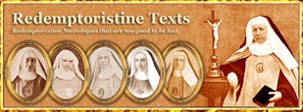
.jpg)









